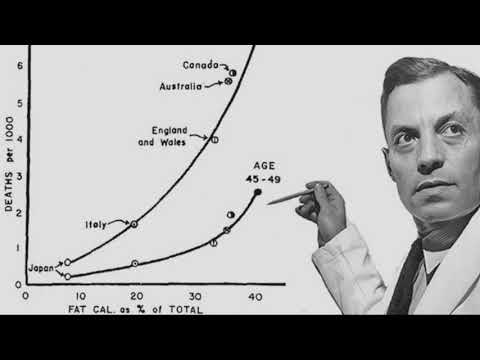It is common to hear the phrase correlation does not imply causality, but this is only sometimes true Yet you seldom hear the more powerful phrase that is ALWAYS true – lack of correlation ALWAYS means lack of causation.
Science requires more than observation to make a conclusion, it always requires an experiment; but when the observation does not hold true we can reject the hypothesis out of hand, as should have happened with the dietary fat hypothesis of heart disease. And we would have in an honest world.
Instead, a fish physiologist named Ancel Keys came onto the scene. Unsurprisingly, he found a career with fish to be a bit of a flop so he switched to the field of human nutrition; but he did keep true to his roots and managed to maintain a quite fishy career.
After the war, authored an observational study called the Seven Countries study, complete with a very scary graph that seemed to show dietary fat was strongly linked to heart disease; however, this graph turned out to be more than a bit fishy. Of the 20+ countries in Europe with available data, he chose only the ones that best fit the point of view he was trying to promote. The remaining countries showed a much different story.
It also turns out that when you plot mortality against sugar consumption using the same data Keys used, you get an even scarier graph. That is, sugar is more strongly correlated with heart disease than fat consumption even in his cherry picked data set.
The Wikipedia page for Keys used to discuss the fact that the sugar industry paid large sums to promote fat consumption as bad instead of sugar, but that has been removed. It also claims the ‘low carb community’ has criticized Keys and the True Health Initiative has written a response to debunk the criticism.
This is a farcical organization devoted to stopping consumption of meat that claims any scientist who doesn’t disclose if he eats meat when studying nutrition has a conflict of interest. And while they don’t disclose their funding sources, it’s pretty clear from their ‘partners’ list where it comes from.
In reality, Ancel Keys did a great deal to promote the interests of the sugar lobby and also P&G, the makers of Crisco. Ironically, even his own Six Countries study was a failure, and did not show saturated fat was associated with heart disease.
In fact, replacing the saturated fat with lineolic oil showed a large uptick in mortality rates for the participants of the study. A result that was kept hidden from the public until well after Keys’s death.
Keys himself stated clearly and publicly that dietary cholesterol was not involved in heart disease, but even blood levels of LDL-C cholesterol are not associated with heart disease. In fact they are overall inversely associated with mortality meaning they could have positive effects.
As it turns out, that is indeed the case. The brain is made largely of cholesterol, and so is the cell membrane of a healthy cell. LDL-C is also involved in fighting pathogens, and even cancer, so little wonder that it is positively associated with lifespan.
That’s probably why statin drugs used to lower it have such terrible side effects.
Epidemiology has only a very limited place in science, and is entirely speculative. Even raw, unbiased observational data with very strong correlations are not really science because no experiment is performed and therefore no causation can be determined; but this form of weak, case dependent correlation can easily be abused to manufacture a *conditional*, special case correlation in a population subset; and that’s what we see, over and over.
That means in reality, this is probably merely random chance at work, because in the rest of the population we can easily pick out the opposite case. They also gloss over the fact that the level of causation could only be in proportion to the level of correlation. So if meat eaters were to have 1% more colon cancer than vegans, and even if this small difference is not random chance, where does the other 99% come from?
If meat eaters smoke just slightly more than vegans or eat slightly more sugar, then these real causes could easily explain this away. And in fact, when we take the same data and compare only vegan smokers to meat eating smokers we find the vegans get 50% more colon cancer! Not 1% but 50%.
So next time someone tries to scare you with yet another goofy statistical analysis from a mysterious group with industry ties, just remember the experimental process is what makes science meaningful; the rest is just speculation.
Music courtesy Karl@whitebataudio
source

